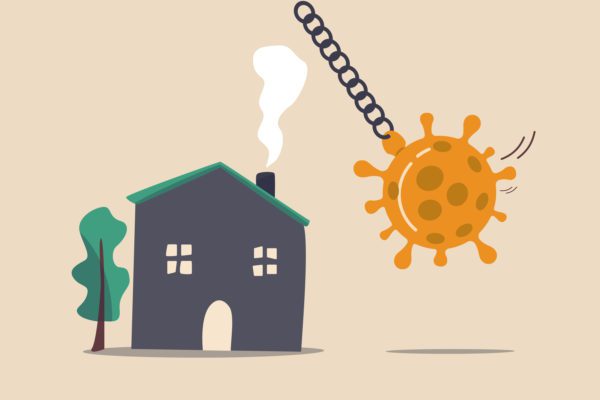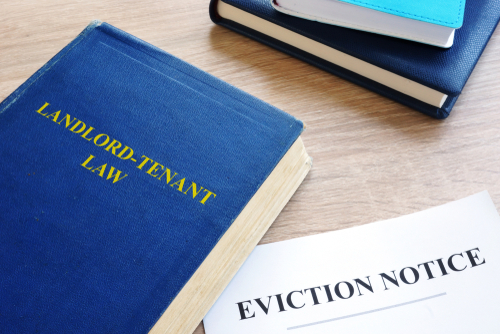
It is safe to say that the COVID-19 pandemic changed the rental industry in many ways. While some regulations were in response to the economic and public health crisis, many restrictions and questions still linger now that things are returning to normal. Landlords across the United States have struggled to keep up with mounting back rent payments, eviction moratoriums, and changing requirements for court filings. However, is there light at the end of the tunnel? Join us below as we review current COVID landlord-tenant laws affecting the state of Virginia and beyond.
Do COVID Landlord-Tenant Laws Still Restrict Evictions?
In September of 2020, the CDC issued a Temporary Halt on Residential Evictions to Prevent the Further Spread of COVID-19. After several extensions, the CDC further modified and extended the order until June 30, 2021. At this time, it is unknown if there will be yet another extension.
Essentially, the Eviction Moratorium means landlords may not evict any tenant that meets the CDC requirements due to non-payment of rent. Let’s review those requirements below –
- Residents have made their best effort to apply for and obtain government or emergency aid.
- The tenant is unable to pay the full rental amount due to a substantial loss of income.
- Tenants are making every effort to make on-time partial rent payments
- If the residents were evicted, they would become homeless or would have to move into a shared living space

Additionally, renters must have one of the following financial criteria to qualify for protection under the CDC eviction order –
- Tenant earned less than $99,000 as an individual or $198,000 when filing taxes jointly in 2020
- The resident did not have to report any income to the IRS in 2020
- Tenants received an Economic Impact Payment (stimulus check)
However, protection under the order is not automatic. In fact, any tenant seeking eviction protection must complete a CDC Eviction Declaration Form. That said, each state handles these declaration requirements a little differently. So, always refer to the district court website in your jurisdiction for the most up-to-date information on COVID landlord-tenant laws.
What Happens if Owners Violate COVID Landlord-Tenant Laws
In short, violating any of the COVID landlord-tenant laws could result in landlords facing fines or criminal action, including jail time. However, it is important to note that states can enact their own laws or restrictions above and beyond the current CDC orders.
So, if a tenant does not qualify for protection under the circumstances above, the state may offer added protection to help prevent eviction. Therefore, checking with your local court is critical to complying with COVID landlord-tenant laws.
The Latest News is Changing COVID Laws
In several states across the US, lawyers challenge the validity of the CDC’s ban on evictions in court. These complaints allege, in part, that the CDC does not have the authority to force such an order on private landlords. The latest in this string of challenges happened in Washington DC in early May. Federal Judge Dabney Friedrich ruled to strike down the national eviction moratorium. Therefore, leaving millions of Americans at heightened risk of losing their homes earlier than expected.
Although the ruling has stayed pending CDC appeal, the case and ruling indicate that landlords have had enough and may have a legal leg to stand on. This could be great news for landlords struggling to stay afloat after months of unpaid rent and limited federal relief.
What Virginia Landlords Need to Know
While restrictions surrounding the COVID-19 pandemic remain, landlords in Virginia need to be aware of certain obligations. So, the help you stay compliant, check out these important considerations below –

- Virginia State law requires landlords to inform tenants about the Department of Housing and Community Development’s Rent Relief Program (RRP). Furthermore, owners must apply for the tenants before pursuing eviction for non-payment. Virginia has one of the most robust aid programs receiving a total of $569 million in government funding so far.
- Should the tenant refuse aid or not actively participate in the process, the landlord may use that as a legally justifiable reason to pursue eviction.
- Without federal protections in place, Virginia allows evictions to proceed if – tenants get denied RRP aid, the state takes more than 45 days to approve the application for assistance, or the aid programs run out of funds.
- The eviction ban protects tenants against evictions for non-payment. That said, other types of eviction claims such as lease violations or tenant holding over can proceed.
Resources for Renters Needing Aid
Do your tenants need assistance with rent payments? To see if they are eligible for the Virginia Rent Relief Program (RRP), call 2-1-1 or visit dhcd.virginia.gov/eligibility. Also, be sure to check out Stay Home Virginia for additional information about the ongoing COVID pandemic efforts.
What Documents Do Renters Need When Applying for Relief?
- ID Verification
- Income or Employment Records
- Proof of Residence/Address
- Evidence of Back Due Rent and Ongoing Rent Responsibility
- Unemployment Application (if eligible)
Leave COVID Landlord-Tenant Laws to the Experts
Keeping up with ever-changing COVID landlord-tenant laws is a complex matter that not every landlord is up for. After all, not following the letter of the law can result in legal issues and expensive fines. Instead of handling the stress alone, reach out to the area’s fastest-growing Northern Virginia property management firm.
At Bay Property Management Group, our team stays up to date on the latest eviction regulations and landlord requirements to make sure your interests remain protected. If you need help navigating COVID landlord-tenant laws or want to see if you are getting the most from your investment, give us a call today.
